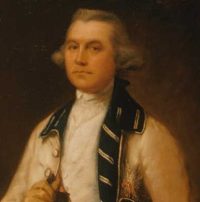The twenty-fifth we seized a fort which the Spaniards had abandoned, named the Polverista,[36] that proved a most excellent place of arms. For Covering the landing of our stores, and securing our communication with the squadron. Col. Monson, who was detached with two hundred men to view the roads and approaches to Manila, occupied the Hermita church, large and commodious, about nine hundred yards from the city. We made the priest’s house the headquarters; sent orders to Maj. More to march up with the 79th regiment to secure and maintain this post, which was of the utmost consequence, both from its strength, and the great cover it afforded us from the rains that had deluged the country, and made it impossible to incamp; for we too soon found, that the monsoon had broke upon us. The surf continued dangerous; the rains increased; the landing of our artillery and stores became very hazardous; our remaining troops were put on shore with much peril, and some loss; Lieut. Hardwick was drowned. But the courage and activity of the seamen surmounted all obstacles; they got on shore part of the Seapoys, some provisions, and such stores as were first wanted, and by signals demanded from the squadron; the officers of which were indefatigable in giving us all possible assistance; and Capt. Jocelyn, who was intrusted with the care of the disimbarkation, did every thing that could he wished or expected from a diligent good officer. We left the marines at our first post, the Malata, to be near the Polverista, to preserve our communications, and guard our stores and park of artillery. The men, from the good conduct and example of their officers, behaved very well, and were of great use upon all occasions. As the rains had forced us to seek the protection of the houses that were under the fire of the bastions, the Spaniards cannonaded our quarters, which were much nearer the walls than the usual rules of war prescribe. They attempted likewise to burn more of their suburbs, but were prevented by the great activity and good conduct of Capt. Fletcher, major of brigade, and Capt. Stevenson and Cotsford, the engineers; who having advanced under cover of the houses to St. Jago’s [i.e., Santiago] church, near the sea, and within three hundred yards of the town, reported its importance so sensibly, that we posted a body of men there, notwithstanding its contiguity to their bastions. The enemy soon fired upon us; but not with perseverance or effect enough to dislodge us. We had some few men killed and wounded.
[36] While the Spaniards were deliberating on the defense of this place, the British captured it. Two companies of fifty men each who had been sent for its defense fled on seeing the British before them, with the exception of twenty-five men, under Captain Baltasar Cosar. See Sitio y conquista de Manila, p. 38.
